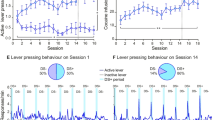Abstract
Rationale: The repeated administration of addictive drugs, such as amphetamine, cocaine, and morphine, produces a progressive enhancement (sensitization) of their psychomotor activating effects. We have previously shown that administration of amphetamine or cocaine in a distinct test environment promotes more robust psychomotor sensitization than if they are given at home. No information is available, however, on whether this environmental manipulation has a similar effect on sensitization to morphine, a drug that enhances dopamine (DA) release in the striatum indirectly by disinhibiting midbrain DA neurons. Objectives: The main goal of present study was to determine whether exposure to a distinct environmental context facilitates morphine sensitization. Methods: As an index of psychomotor activation, we used rotational behavior in rats with a uni- lateral 6-hydroxydopamine lesion of the mesostriatal DA system. There are inconsistencies in the literature regarding the ability of morphine to elicit rotational behavior. Therefore, in experiment 1 we determined the effect of 2.0, 3.0, 4.0, 6.0, and 8.0 mg/kg, IP, of morphine on rotational behavior. In experiment 2, we studied the effect of five consecutive IV infusions of saline or morphine (2.0 mg/kg) in rats treated either in their home cage or in a distinct and relatively novel test environment. After 5 days of withdrawal, all rats received an IV infusion of 2.0 mg/kg morphine (Morphine challenge). The following day all rats received an IV infusion of saline (Saline challenge). Results: Morphine produced a dose-dependent increase in rotational behavior. Environmental novelty enhanced both the acute psychomotor response to morphine and its ability to induce psychomotor sensitization. Furthermore, a conditioned rotational response was seen only in animals treated in the novel environment. Conclusions: Environmental novelty can facilitate the development of sensitization to the psychomotor activating effects of major addictive drugs, such as amphetamine, cocaine, and morphine.
Similar content being viewed by others
Author information
Authors and Affiliations
Additional information
Received: 29 November 1999 / Accepted: 14 March 2000
Rights and permissions
About this article
Cite this article
Badiani, A., Oates, M. & Robinson, T. Modulation of morphine sensitization in the rat by contextual stimuli. Psychopharmacology 151, 273–282 (2000). https://doi.org/10.1007/s002130000447
Issue Date:
DOI: https://doi.org/10.1007/s002130000447




